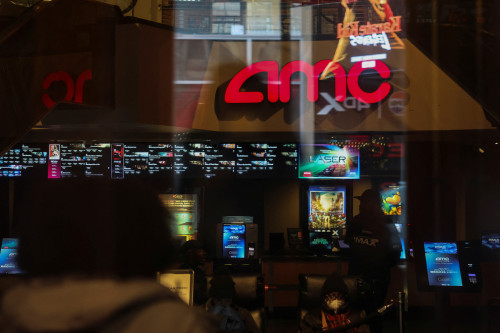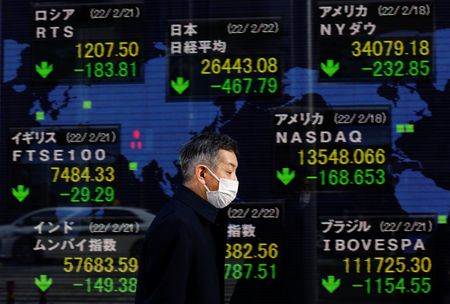 1
1 1
1

By Alun John
HONG KONG (Reuters) – Asian shares and U.S. futures rose on Wednesday as U.S. inflation figures were not as high as markets had feared, causing U.S. yields to pause their march higher.
Share market sentiment was capped, though by, higher oil and other commodity prices after Russian President Vladimir Putin said that on-and-off peace negotiations with Ukraine “have again returned to a dead-end situation for us”, which kept the euro stuck at a five week low.
Much weaker-than-expected import data from China also weighed on the outlook, though it added to views Beijing will have to ease policy again soon.
MSCI’s broadest index of Asia-Pacific shares outside Japan rose 1%, lead by Korea’s KOSPI, which was up 1.5%. Japan’s Nikkei jumped 1.97%.
S&P500 futures gained 0.67% and Nasdaq futures gained 0.65% in Asia trade, but EUROSTOXX 50 futures lost 0.2%, weighed down by Putin’s comments.
Data published on Tuesday showed U.S. monthly consumer prices increased by the most in 16-1/2 years in March as war in Ukraine boosted the cost of gasoline to record highs, cementing the case for a 50 basis points interest rate hike from the Federal Reserve next month.
However, monthly underlying inflation pressures moderated as goods prices, excluding food and energy, dropped by the most in two years.
The data sent U.S. yields lower on Tuesday, snapping seven straight sessions of gains, though they regained a little ground late in the day and in Wednesday trade.
The yield on 10-year Treasury notes was at 2.7462%, compared to an over three-year peak of 2.836%, before the inflation data.
The two year yield was 2.3973%.
The moves in yields “gave a nod to the rhetoric that U.S. inflation has likely peaked or is very close to it,” said Clara Cheong, a strategist at JPMorgan Asset Management.
“While this is unlikely to change the trajectory of the Fed from hiking 50 basis points in May, if inflation continues on this path there will be less pressure on them to be overly aggressive in the second half of the year.”
“However, equity markets gave back gains as oil rose back above $100 barrel as progress in Russia-Ukraine peace talks came to a standstill and China started reopening Shanghai very gradually.”
Brent crude briefly dropped below $100 earlier this week, but rallied sharply on Tuesday, and largely held its gains on Wednesday.
Brent crude futures were up 0.1% at $104.75 a barrel and U.S. West Texas Intermediate were steady at $100.7.
Commodities analysts at CBA attributed the gains in oil to Putin’s statement, which also caused agricultural commodities to gain, as “the already small risk that Black Sea supplies might normalise to any degree through mid‑year is likely down to zero.”
Corn futures were back near last month’s 11 year high.
Chinese share markets were choppy after data which showed China’s export growth held up well in March, but imports fell 0.1%, the first decline since August 2020 and much worse than analysts’ 8% growth forecast.
Chinese blue chips recovered from earlier losses to trade flat, lagging most of the region.
For currency markets, Putin’s remarks were a major driver with the euro pinned to a five-week low and commodity currencies finding support due to the higher oil prices. [FRX]
The New Zealand dollar had a busy day, rising as high as $0.6901 and falling as low as $0.6808 after the Reserve Bank of New Zealand raised interest rates by a chunky 50 basis points — its most aggressive hike in over two decades — but tempered its rate outlook. It was last down 0.34% at 0.6823.
The Bank of Canada meets later on Wednesday and is also expected to deliver a sharp hike.
Spot gold gained 0.3% higher to $1,973.1 an ounce. [GOL/]
(Reporting by Alun John; Editing by Christopher Cushing and Kim Coghill)